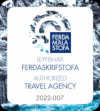Culture Tours
Home » All Tours & Nordic Travel Destinations » Iceland Tours » Museums and Culture
Travel Destinations
Travel Deals with Skyscanner
Flights?
Haven’t bought your flights yet? Use Skyscanner’s search engine. The best tickets, at the best price.
Car?
Need to rent a car? Use Skycanner’s search engine. Find the best vehicles. At the best price.
Hotel?
Have you decided where to sleep yet? Find the best accommodation at the best price. Use Skyscanner.
e-SIM Card
Need help? Request a call.
It's free.
Do you have any questions about which country to visit? Don’t know what activities to choose or how much time or money you’ll need? Schedule a 15-minute call with us and ask whatever you want.
Need help? Request a call.
It's free.
Do you have any questions about which country to visit? Don’t know what activities to choose or how much time or money you’ll need? Schedule a 15-minute call with us and ask whatever you want.
Museums and Culture
The full Icelandic experience: visit their museums and learn their culture
Iceland has a number of museums that offer insight into the country’s unique culture, history and natural environment. These are just a few of the many museums and cultural attractions that Iceland has to offer. Whether you’re interested in history, art, science, or just want to learn more about Icelandic culture, there is sure to be a museum in Iceland that will pique your interest. Here are some of the top museums to visit in Iceland:
Museums in Iceland
National Museum of Iceland: The National Museum of Iceland, located in Reykjavik, offers a comprehensive overview of Icelandic history and culture, from the Viking Age to the present day.
The Icelandic Phallological Museum: Located in Reykjavik, the Icelandic Phallological Museum is a unique museum that features a collection of over 200 penises and penile parts from a variety of animal species.
Reykjavik Maritime Museum: The Reykjavik Maritime Museum, located in the old harbor area of Reykjavik, offers a fascinating look at Iceland’s seafaring history and its relationship with the sea.
The Settlement Exhibition: The Settlement Exhibition, also located in Reykjavik, offers a glimpse into the lives of Iceland’s early settlers, with a focus on the excavated remains of a Viking Age longhouse.
The Icelandic Punk Museum: Located in Reykjavik, the Icelandic Punk Museum offers a unique look at Iceland’s punk rock scene in the 1980s and the impact it had on the country’s culture and society.
The Aurora Reykjavik Northern Lights Center: The Aurora Reykjavik Northern Lights Center offers a multimedia experience that explores the science and folklore behind the Northern Lights, one of Iceland’s most famous natural phenomena.
Icelandic Culture: Learn their cultural heritage
Icelandic culture is deeply rooted in the country’s unique geography, history, and traditions. Overall, Icelandic culture is diverse and rich, with a strong emphasis on tradition, storytelling, and the natural environment. Despite its small size, Iceland has had a significant impact on the world of art, literature, and music, and its unique culture continues to fascinate and inspire people around the world. Here are some of the key aspects of Icelandic culture:
About the Icelandic Culture
Literature: Iceland has a long and rich literary tradition, dating back to the Viking Age. The country’s sagas and myths are some of its most famous literary works, and Icelanders have a strong tradition of storytelling.
Music: Iceland has a thriving music scene, with many internationally acclaimed artists coming from the country. Icelandic music often draws on traditional folk and pop influences, as well as the country’s unique landscapes and natural environment.
Language: Icelandic is the official language of Iceland, and it is a unique and ancient language that has remained largely unchanged since the Viking Age. Icelanders are proud of their language and work to preserve it.
Art: Iceland has a strong tradition of visual arts, with many contemporary and traditional artists creating works that draw on the country’s landscapes and history.
Folklore: Iceland has a rich tradition of folklore and superstition, with many stories of elves, trolls, and other supernatural beings. Many Icelanders still believe in these stories and work to protect the country’s natural landscapes from harm.
Food: Icelandic cuisine is often focused on local and seasonal ingredients, with many traditional dishes featuring seafood, lamb, and dairy products. Iceland is also known for its unique foods, such as fermented shark and sheep’s head.



